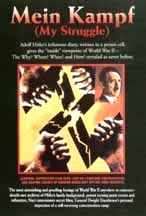Even though 80 years have elapsed since he wrote it, Adolf Hitler's Mein Kampf is still legally banned in Germany. And we fear the ghost of Hitler so greatly that few wish to mark, or even acknowledge, the anniversary of Mein Kampf's publication.
You may hate the book and its author, but it would have to be included on any list of books that changed the world.
The first part of Mein Kampf was published under the title Eine Abrechnung (A Reckoning) on July 18, 1925. The second part came out in 1926.
Hitler's preferred title was Four-and-a-Half Years Of Struggle Against Lies, Stupidity And Cowardice; his German publisher sensibly condensed this to My Struggle.
Mein Kampf had few readers -- the style was as rambling, hectoring and unwieldy as Hitler's original title indicated. A bare 9,000 copies sold in 1925, though by 1930, sales had reached a respectable 54,000.
In 1933, after Hitler won the election, the book sold an estimated 1.5 million copies.
As Mein Kampf sold briskly, other books burned. On May 10, the Nazis held mass bonfires of books that expressed an 'un-German' spirit.
Works by Marx, Freud, Proust, John Dos Passos, Brecht, Helen Keller, Hemingway, Einstein, Thomas Mann and Jack London were consigned to the flames.
Photographs from that time show huge bonfires surrounded by exulting students. A quote from Heinrich Heine was passed around at the time; no one knew how grimly apposite it would be: 'Where one burns books, one will soon burn people.'
In Hitler's Germany, Mein Kampf was a bestseller: a copy was given to every German couple who got married, every Nazi was expected to own the book. By 1945, eight million copies of the book had sold.
Today, Mein Kampf is still widely available everywhere, bar Germany. It is many things: an artifact of fear and loathing, a symbol of unspeakable evil, an index of how far we really believe in free speech.
When sales of the book spiked in Turkey this summer, some saw it as an indication of a growing tendency towards fundamentalism.
It's hard to read Mein Kampf as just a book; the terrible history its author imposed on Europe and the ghosts of the Holocaust haunt every line of it.
But this depressing document, blending paranoia with appalling hostility and badly constructed arguments, must be read so that we don't forget the banality of evil.
Hitler wrote in vitriol: 'Was there any form of filth or profligacy without at least one Jew involved in it? If you cut even cautiously into such an abscess, you found, like a maggot in a rotting body, often dazzled by the sudden light -- a kike!'
These statements, like Hitler's championing of an abhorrent nationalism, his obsession with the 'master race' and his advocating of mass propaganda, have been analysed all too often.
Re-reading Mein Kampf, what struck me was a passage where Hitler explained his philosophy of reading: 'For reading is no end in itself, but a means to an end... a man who possesses the art of correct reading will… instinctively and immediately perceive everything which in his opinion is worth permanently remembering, either because it is suited to his purpose or generally worth knowing. Once the knowledge he has achieved in this fashion is correctly coordinated within the somehow existing picture of this or that subject created by the imaginations it will function either as a corrective or a complement…"
For years, I've seen Mein Kampf as the work of a bad writer; now I see it as the work of a terrifyingly bad reader. Hitler looked for nothing in literature but confirmation of his own narrow, inhuman views, and because he blinkered his vision so well, he found only confirmation, not illumination, certainly not compassion.
Over the years, Mein Kampf has lost its readership -- only the bigoted, those with closed hearts and minds, find any kind of enlightenment in its pages.
For the rest of us, what those pages reveal is a thin, peevish voice, one that blends self-pity with hatred in repulsive fashion.
But the books Hitler's armies burned that day in May, those books are still read, still discussed, still enjoyed, still alive. The Fuehrer is dead; it's time to lay the ghost of his bad writing to rest as well.
The WORST Book in the world
Langganan:
Posting Komentar (Atom)







0 komentar:
Posting Komentar